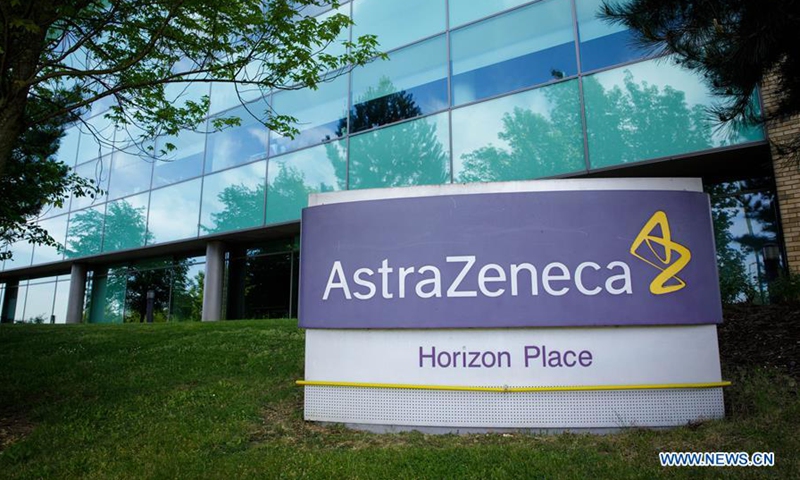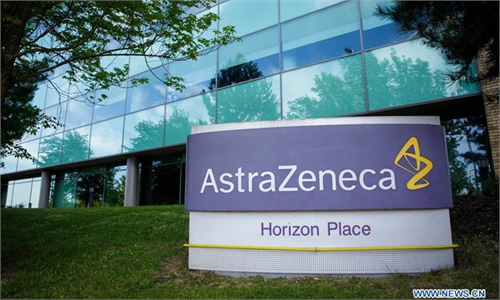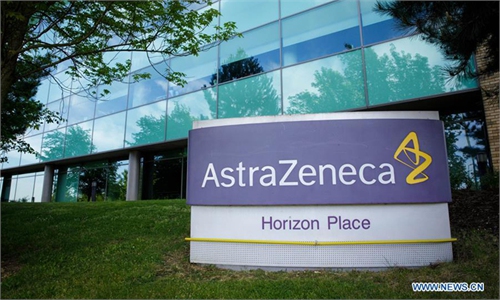Chinese vaccine reliable alternative for EU as reflected in Hungary's trust, experts say
Gap in standards slows approval in Europe: expert

Photo taken on May 18, 2020 shows a logo in front of AstraZeneca's building in Luton, Britain. AstraZeneca, which is developing a possible vaccine against COVID-19 in partnership with the University of Oxford, on Wednesday put on hold the phase-3 trial of its vaccine following an unexplained illness in one trial participant in Britain. (Photo by Tim Ireland/Xinhua)
The row between the European Commission and Western vaccine manufacturers over a delay to supply doses continued to ferment over the weekend as many are concerned that despite the EU's approval of the Oxford-AstraZeneca vaccine on Friday, supplies will remain scarce. Rather, EU member Hungary's trust in Chinese vaccines shows it is a reliable alternative for the EU, particularly in urgent cases.
Hungary on Friday issued temporary authorization to Chinese front-runner vaccine producer Sinopharm, the first EU member to approve a Chinese coronavirus dose, instead of placing all its hopes on US and UK pharmaceuticals for late jabs like other neighbors.
At the same time, the EU granted conditional marketing authorization on Friday for the Oxford/AstraZeneca vaccine, at the end of a week-long clash between the EU and the company over seriously reduced and delayed shipments than the 27-nation bloc had contracted.
Hours later, Brussels imposed new export restrictions on Saturday to require its customs to block all COVID vaccine exports if the EU's own orders and injection needs have not been met.
Observers said the EU's export ban exposes the worrisome scarcity of vaccines in Europe, as well as an increasingly intense scramble for doses.
Amid a white-hot race on vaccine distribution, Chinese inactivated-virus vaccines, a potential reliable choice, offers at least another tool for the EU to vaccinate the public as soon as possible while new variants sweep across the EU.
The Hungarian government on Friday gave the green light for Sinopharm's vaccine, sealing a deal for 5 million doses for local emergency use. More than 10 million doses of the vaccine have been given worldwide.
Hungarian Prime Minister Viktor Orban said he would personally opt to receive the Chinese vaccine, as he trusted it more than others, media reported.
Foreign Minister Peter Szijjarto said the Sinopharm vaccines which were enough to inoculate 2.5 million people, or about a quarter of its population, would be delivered in four batches over four months. Orban said the government had monitored inoculations using the Chinese vaccine in neighboring Serbia, Reuters reported.
Chinese vaccine's safety and quality are not the main concern of the EU in imports, as China's drug regulator has followed equally rigorous global standards in vaccine Good Manufacturing Practices with its EU counterparts, Jiang Chunlai, a professor from Jilin University's School of Life Sciences, told the Global Times on Sunday.
But Jiang suggested that EU countries would normally consider using Chinese vaccines only when EU's domestically produced ones cannot meet demand. "It is partly due to a belief in the superiority of their drug R&D among some EU countries, just like Chinese people would trust self-made vaccines more than, let's say, those imported from India, if any, which in reality are not of poor quality."
However, another Beijing-based immunological professor who asked for anonymity told the Global Times on Sunday that there was still a gap between Chinese and EU drug approval standards, hindering the approval progress of Chinese vaccines in EU countries.
Moreover, many European experts remain skeptical of the use of inactivated vaccines against the coronavirus, as the mRNA type developed by Pfizer and Moderna has been dominant in the EU market and they may lack enough data to approve a Chinese vaccine, the anonymous expert said.
The Hungarian Medical Chamber (MOK) warned that Budapest should continue "to follow drug safety rules in a transparent manner and only approve marketing of products after a review respecting European Medicines Agency rules."
Usually, regulators from European countries need to visit the production line of Chinese vaccine makers before they can make an approval decision, but that is prevented by quarantine policy, experts suggested.
If the vaccine passes WHO pre-certification, it will greatly encourage the smooth promotion and use of the Chinese vaccine in Europe, said Jiang.
Chinese COVID-19 vaccine developers - Sinovac, Sinopharm and CanSinoBio - have submitted applications to join the WHO's COVAX plan.
A representative of Sinovac told the Global Times that application approval needs time as the WHO has to first inspect the firm's vaccine production lines and go through a rigorous review and assessment before getting WHO's precertification, as requested by the WHO's Emergency Use Listing (EUL).



